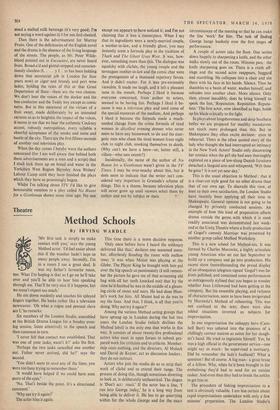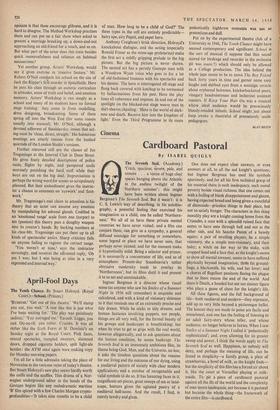Theatre
Method Schools
WARDLE By IRVING He sits down modestly and touches his splayed fingers together. He looks rather like a television newscaster. 'Oh what a mane and peasant slave am I,' he remarks.
Six members of the London Studio, assembled at the British Drama League for a Sunday even- ing session, listen attentively to the speech and then comment in turn.
'I never felt that contact was established. That was one of your tasks, wasn't it?' asks the first.
`Perhaps the two tasks cancelled one another out. Father never arrived, did he?' says the second.
`You didn't seem to need any of the lines; you were too busy trying to remember them.'
'It would have helped if we could have seen more of the eyes' 'No. That's beside the point. It's a directional comment.'
`Why not try it again?'
The actor tries it again. This time there is a more decisive response.
`Only once before have I heard the soliloquy delivered like that,' declares one seasoned mem- ber, effortlessly flooding the room with mellow tone; 'it was when Moissi was playing at . the Globe. The Player King he brought with him put over the big speech so passionately (I still remem- ber the picture he gave me of that screaming old hag with all her teeth knocked out) that by the time he'd finished he was in the middle of a gleam- ing circle of sweat and tears. He had done Ham- let's work for him. All Moissi had to do was to say the lines. And that, I think, is all that you're doing. Why not try it again?'
Among the various Method acting groups that have sprung up. in London during the last two years the London Studio (which declines the Method label) is the only one that works in this way. It consists of about twenty-five professional actors who meet in open forum to submit pre- pared work for criticism and to .criticise. Member- ship costs .nothing, and the directors, Al Mulock and David de Keyser, act as discussion leaders : they do not instruct.
Actors who join the studio do so to strip their work of cliché and to extend their range. The process of doing this, though sometimes diverting to look at, is deliberately untheatrical. The slogan is 'Don't act: react.' If the actor has a line, 'I ran into George today,' he is a long way from being able to deliver it. He has to go quarrying within for the whole George and for the exact circumstances of the meeting so that he can make the line 'work' for him. The task of finding George hangs leadenly over the first stages of performance.
A couple of actors take the floor. One settles down happily to sharpening a knife, and the other walks slowly out of the room. Minutes pass : the knife sharpening goes on. There is a crash off- stage and the second actor reappears, haggard and stumbling. He collapses into a chair and sits there with his face in his hands. Silence. Then he shambles to a basin of water, washes himself, and subsides into another chair. More silence. Only then, almost inaudibly, does he bring himself to speak the line, 'Reputation. Reputation. Reputa- tion.' The first actor, now identified as Iago, holds up his blade critically to the light.
In plays about longshoremen and deep Southern belles we are prepared for stealthy manoeuvres not much more prolonged than this. But in Shakespeare they often excite derision : even in rehearsal. There is the often quoted story of the lady who thought she had interrupted an intimacy in the New York Actors' Studio only discovering her mistake when the girl she had seen thoroughly explored on a piece of low-slung Danish furniture detached a languid arm and whispered, 'Wilt thou be gone? It is not yet near day.'
This is the usual objection to Method : that it is a clear-cut style good for no other drama than that of our own age. To discredit this view, at least to their own satisfaction, the London Studio have recently been applying all their time to Shakespeare. General opinion is not going to be changed by privately conducted sessions. An example of how this kind of preparation affects drama outside the genre, with which it is most readily associated was demonstrated' last week- end at the Unity,Theatre where a lively production of Gogol's comedy Marriage was presented by another group called Method Workshop.
This is a new school for Method-ists. It was formed by Charles Marowitz, a highly articulate young American who set out last September to build up a company and go into production. His recent show (notwithstanding the proud display of an obsequious telegram signed `Gogor) was far from polished, and contained some performances so outrageously stylised that you began to wonder whether Joan Littlewood had been getting at the company. But the ensemble playing, and richness of characterisation, seem to have been invigorated by Marowitz's Method of rehearsing. This was not confined to the text; there were also added situations invented as subjects for improvisation.
In one improvisation the unhappy hero (Cam- bell Barr) was ushered into the presence of a chillingly correct matron as suitor for her daugh- ter's hand. He tried to ingratiate himself. Yes, he was a high official in the government service—one might say as much : he supervised a mortuary. Did he remember the lady's husband? What a question ! But of course. A big man : a great brute of a fellow. Why, when he'd been brought in for embalming they'd had to send for an outsize casket. And even then they had to break the ankles to get him in.
The procedure of linking improvisation to a text is obviously valuable. I am less certain about rapid improvisations undertaken with only a few minutes' preparation. The London Studio's opinion is that these encourage glibness, and it is hard to disagree. The Method Workshop practises them and can put on a fair show when asked to present a marriage breaking up, a down-and-out approaching an old.friend for a touch, and so on. But what part of the actor does this train besides quick resourcefulness and reliance on habitual mannerisms?
Yet another group, Actors' Workshop, would say it gives exercise in 'creative fantasy.' Mr. Robert O'Neil conducts his school on the site of Jack the Ripper's first murder in Spitalfields. Here he puts his class through an esoteric curriculum in attitudes, sense of truth and belief, and emotion memory. Actors' Workshop is run simply as a school and many of its students have no formal stage training: they come in from modelling, dress designing, broadcasting. Some of them spring off into the West End (for some reason usually into musical). Mr. O'Neil, although a devoted adherent of Stanislaysky, insists that act- ing must be 'clean, direct, straight.' His boisterous meetings are utterly remote from the hushed quietude of the London Studio's sessions.
Further removed still are the classes of Jos Tregoningo at the Interval Club in Dean Street. He gives finely detailed descriptions of police raids, flights by night, and pampered molls morosely punishing the hard, stuff while their boys are out on the big deal. Improvisation is perhaps the wrong word for scenes so scrupulously planned. But their embodiment gives the instruc- tor a chance to comment on `eyework' and 'foot- work.'
Mr. Tregoningo's real claim to attention is his theory that an actor can assume any emotion by manipulating his adrenal glands. Codified in an 'emotional range' scale from one (torpor) to ten (passion) this theory puts a doughty weapon into its creator's hands. By barking numbers at his class 'Mr. Tregoningo can put them up to all kinds of spectacular antics. Sharp criticism falls on anyone failing to register the correct range.
`You weren't at nine,'• says the instructor accusingly, and receives the affronted reply, 'Oh yes I was; but I was being at nine in a very repressed and internal way.'



































 Previous page
Previous page